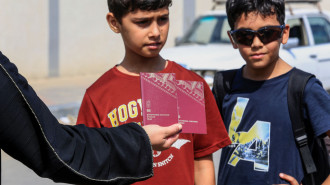As US university classes resume, so do concerns over curtailing free speech and support for Palestine
As university students across the US head back to campus, many administrations are taking pre-emptive measures to prevent the wave of pro-Palestinian demonstrations that took place during the last academic year, raising concerns among some students and faculty of impingements on free speech.
Some universities have erected signs in indoor and outdoor common areas stating that overnight demonstrations are banned, as are loudspeakers at certain hours, in an apparent reference to last year's protests. Some campuses are now only allowing access to those with student identification cards, a change in policy that closes the universities off from their own neighbours. And in one of the odder campus crackdowns, Harvard has forbid students from using chalk to write on the pavements, to which several professors have responded by writing their own messages in chalk on the pavement.
In a recent survey conducted by the Foundation for Individual Rights and Expression, in which students were asked to rate their universities' openness to free speech and expression, Harvard and Columbia were ranked at the bottom, with the majority of respondents (55 percent) saying it was difficult to openly discuss the Israeli-Palestinian conflict. Though it's unclear from the survey which side of the conflict the student respondents sympathise with, what is clear is that there is a discomfort among students with how their administrations are handling discussions of the issue.
The pro-Palestinian campus protests started shortly after the outbreak of Israel's war in Gaza in October, which has killed more than 41,000 Palestinians, most of them civilians. Among the main demands of the protesters has been for universities to divest from investments related to Israeli weapons.
These campus policy changes haven't gone unnoticed by students and faculty, many of whom are speaking out, even before many US universities begin the academic year.
The American Association of University Professors issued a statement last month condemning what they see as overly restrictive policies that could hamper free speech.
"Our colleges and universities should encourage, not suppress, open and vigorous dialogue and debate even on the most deeply held beliefs," they wrote.
The Middle East Studies Association, which also represents academics, issued a letter last month, which they shared on their website, defending three University of Pennsylvania professors accused of making antisemitic remarks and supporting Hamas.
These accusations are linked to a Republican-led congressional investigation by the House of Representatives Committee on Education and the Workforce, which the MESA academic describe as a witch hunt.
In its latest public statement, MESA noted a previous letter it sent to the House Committee, which says that "[t]hrough its recent investigations and public hearings, the committee has threatened the freedoms essential to university life and learning, including academic freedom, freedom of speech, and freedom of assembly. As a result of this campaign, the committee has made our campuses less safe for students, faculty and staff alike."
Robert Vitalis, a former UPenn professor of political science, who took early retirement last year due to the tense political climate on campus, and whose name is listed in the House Committee investigation, told The New Arab, "Everyone is worried about the extent to which free speech will be shut down and the administration not permitting open expression."
"I don't know what's ahead, but I think folks are being cautious. I'm not in my office any more. I can just tell you in general that folks on this side are worried about the administration shutting things down," he said.




 Follow the Middle East's top stories in English at The New Arab on Google News
Follow the Middle East's top stories in English at The New Arab on Google News
![People gathered around the rubble of destroyed houses to search for survivors [Getty]](/sites/default/files/styles/image_330x185/public/2024-11/GettyImages-2184733820.jpg?h=199d8c1f&itok=NiM1LO2f)

